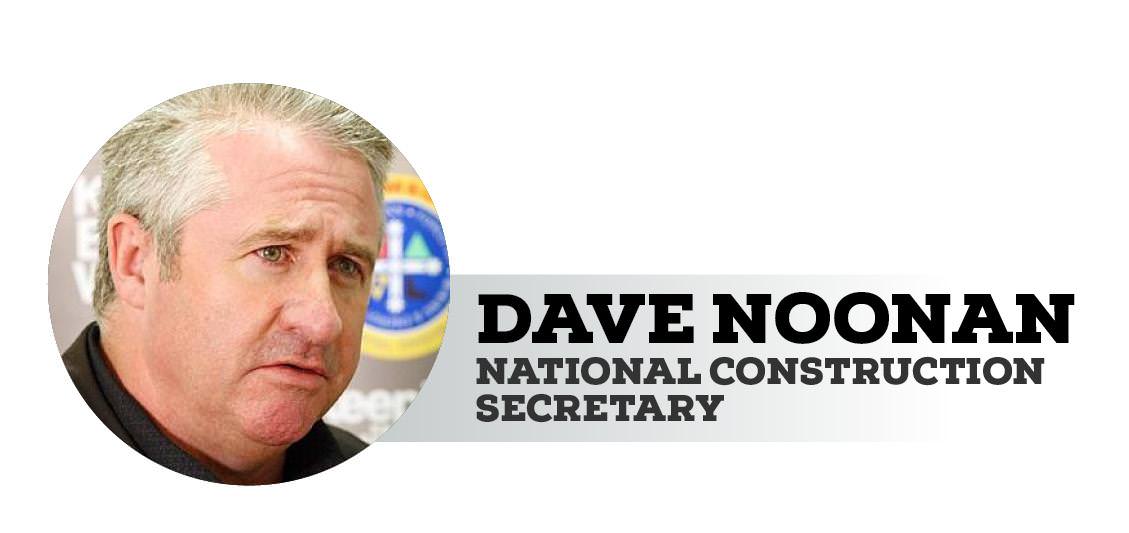In late February, a man died while at work on the Royal Adelaide Hospital site in South Australia.
Steven Wyatt was a husband, a father, a brother, and a friend. Just 15 months prior to his death, in late 2014, another worker, Jorge Castillo-Riffo was also killed on that site in similar circumstances. Both tragedies involved a fatal crush injury when the men were in the scissor lift.
Both accidents were utterly preventable.
Castillo-Riffo’s widow, Pam Gurner-Hall has spent the last 14 months calling for a coroner’s inquest into his death so that – in her words – ‘this could be prevented.’ In this, she has been joined by the CFMEU, and South Australian Secretary Aaron Cartledge has once again called for an inquest into this latest tragedy.
At the time of Castillo-Riffo's death, SafeWork South Australia laid charges against the contractors who were building the Royal Adelaide Hospital for failing to comply with health and safety regulations to provide a safe working environment.
It’s interesting to note, then, that this site which has been plagued by safety has been one of intense scrutiny by the Fair Work Building Commission (FWBC). In fact, taxpayers might be interested to know that an estimated $750,000 has been expended by the FWBC persecuting and prosecuting workers on the health precinct site in Adelaide.
In 2014, 23 workers were charged with fines of over $10,000 each for walking off the job over safety 12 months before. At the time, the water supply had been turned off, the toilets weren’t working, there was no drinking water and the emergency showers weren’t functioning for several hours. The workers faced a choice: either take action and get the problem resolved or put their health at risk. They took the former route and were punished for doing so.
This year alone, there have been eight fatalities and while eight families are mourning the passing of a loved one, the Liberal Government has been threatening the country with a double dissolution election if the Senate does not pass the ABCC bill.
The government has been running the line for some time that the ABCC is needed to be a tough cop on the beat to address crime and corruption in the industry, but the truth is that the ABCC is only an industrial regulator. It won’t and can’t look at criminal matters, but what it can and most certainly will do is curb the rights of workers and make it even harder for them to stand up for their health and safety.
If anyone is in doubt about this, they simply need to recall the ABCC’s prosecution of rigger Ark Tribe. In 2008, Tribe was facing six months jail for failing to front an ABCC interrogation where he would have been required to report on who had spoken up at a site meeting about a safety matter.
At the end of 2015, two young men died on a construction site in Perth, and while the whole of West Australia went into mourning, many of us in the CFMEU were angry.
We were angry that our union was prevented a total of 16 times from entering that site. One wonders what it was that the company didn’t want us to see.
Perhaps it was dodgy work practices - perhaps commonplace but nevertheless lethal safety breaches. Perhaps we would have found a lack of appropriate training and induction for people new to the construction industry.
These are the issues that cause arguments with employers who are always in a rush to get things done, always in a rush to cut a corner here or there in order to make a bigger profit. These are the things that a lot of employers don’t want to concern themselves with and regard us as pests for interfering in their work, calling on the Fair Work Building Commission to remove us from sites.
Everyone talks safety and everyone’s sorry when people are killed on the job. While I accept that their sorrow is genuine, the fatalities are happening too often in our industry and employers, the MBA and the government authorities should abandon their cavalier and often hostile attitude to the union and sit down and cooperate with us to improve safety standards.
Construction sites are dangerous places. Workers need proper training and induction. Safety standards exist for a reason and must be implemented. To us, none of these things are negotiable. It’s not something to address when you can get around to it, or when you have the time.
Unfortunately, it seems the CFMEU is the only party reminding employers that it’s their legal obligation to address safety issues. It’s not an optional thing. And for that, that we get labelled troublemakers and lawbreakers, are hounded by the FWBC and smeared by the federal government in order to justify passing a set of laws that will make it even worse for workers and unions in the industry.
Recently, someone called talkback radio and in line with the rhetoric coming out of Canberra, labeled the CFMEU a ‘protection racket.’
It’s hard to know what they mean by that, what we’re protecting. But if fighting every day to protect the lives of people whose friends and families expect them home at the end of each day is considered a racket, then throw me in jail.
People’s lives matter. They matter more than making an even bigger profit margin for some developer.
Just ask the families of those who were killed. That’s whose side we’re on. That’s who we’re protecting. And all those clamouring for the return of the ABCC want to stand in our way.

